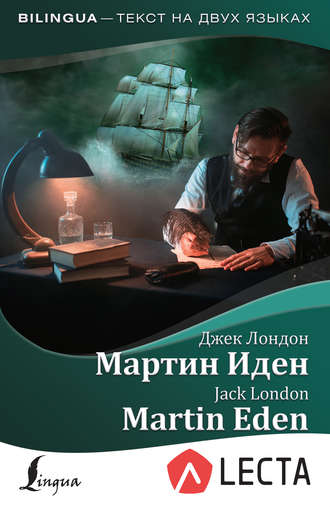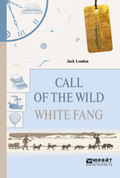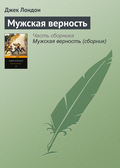
Джек Лондон
Мартин Иден / Martin Eden (+ аудиоприложение LECTA)
Chapter 10
He stopped to dinner that evening, and, much to Ruth’s satisfaction, made a favorable impression on her father. They talked about the sea as a career, and Mr. Morse remarked afterward that he seemed a very clear-headed young man. Martin talked slowly, which enabled him to find the best thoughts that were in him. His shyness and modesty even commended him to Mrs. Morse.
“He is the first man that ever drew notice from Ruth,” she told her husband.
Mr. Morse looked at his wife curiously.
“You mean to use this young sailor to wake her up?” he questioned.
“I mean that she is not to die an old maid if I can help it,” was the answer. “If this young Eden can arouse her interest in mankind in general, it will be a good thing.”
“A very good thing,” he commented. “But suppose, – and we must suppose, sometimes, my dear, – suppose he arouses her interest too particularly in him?”
“Impossible,” Mrs. Morse laughed. “She is three years older than he, and, besides, it is impossible. Trust that to me.”
Sunday Martin had intended to devote to studying for the high school examination. But some days after he learned that he had failed in everything save grammar.
“Your grammar is excellent,” Professor Hilton informed him, staring at him through heavy spectacles; “but you know nothing, positively nothing, in the other branches, and your United States history is abominable – there is no other word for it, abominable.”
“Yes, sir,” Martin said humbly.
“And I can advise you to go back to the grammar school for at least two years. Good day.”
“You see I was right,” said Ruth. “It is because you need the discipline of study. Professor Hilton is right, and if I were you, I’d go to night school.”
But if my days are taken up with work and my nights with school, when am I going to see you? – was Martin’s first thought. He said:
“It seems so babyish for me to go to night school. I can do the work quicker than they can teach me. It will be a loss of time – ” he thought of her – “and I can’t afford the time. I have no time to spare, in fact.”
She looked at him gently. “Physics and chemistry – you can’t do them without laboratory study; and you’ll find algebra and geometry almost hopeless with instruction. You need the skilled teachers, the specialists.”
Chapter 11
Martin went back to his pearl-diving article. After that he wrote an article on the sea as a career, and another on turtle-catching. Then he tried, as an experiment, a short story, and he had finished six short stories and sent them to various magazines. He wrote, intensely, from morning till night, and late at night, except when he went to the reading-room, draw books from the library, or saw Ruth. He was profoundly happy. The joy of creation was his. All the life about him – the odors of stale vegetables and soapsuds, his sad sister, and the jeering face of Mr. Higginbotham – was a dream. The real world was in his mind, and the stories he wrote were reality.
The days were too short. There was so much he wanted to study. He cut his sleep down to five hours.
In the meantime the weeks were passing, his money was coming out, and there was no money coming in. A month after the adventure story for boys was returned to him by THE YOUTH’S COMPANION. The SAN FRANCISCO EXAMINER did the same: at the end of the fifth week the manuscript came back to him, by mail, without comment. In the same way his other articles came back from the other leading San Francisco papers. When he recovered them, he sent them to the magazines in the East, from which they were returned more promptly.
The short stories were returned in similar fashion. He read them over and over, and liked them so much that he could not understand the cause of their rejection. He decided to read some stories to his sister.
“That story was perfectly grand,” she announced; “but it makes me sad. I want to cry. There is too many sad things in the world anyway. It makes me happy to think about happy things. Where are you going to sell it?”
“Hm, that’s not so easy,” he laughed.
“But if you DID sell it, what do you think you’d get for it?”
“A hundred dollars.”
“Oh! I do hope you’ll sell it!”
“Easy money, eh?” Then he added proudly: “I wrote it in two days. That’s fifty dollars a day. But nobody wants to publish them.”
He wanted to read his stories to Ruth, but did not dare.
Chapter 12
It was the circle of socialists and working-class philosophers that gathered in the City Hall Park on warm afternoons that was responsible for the great discovery. Once or twice in the month, Martin listened to the arguments. The tone of discussion was much lower than at Mr. Morse’s table. The men were not grave and dignified. They lost their tempers easily.
They spoke about Herbert Spencer in the park. So the great discovery began. Martin tried to read Spencer, and chose the “Principles of Psychology” to begin with. But he did not understand the book, and he returned it unread.
Martin Eden was very curious, and he wanted to know. This desire had sent him to travel around the world. He tried to read Spencer again. But his ignorant and unprepared attempts at philosophy had been fruitless. The medieval metaphysics of Kant had given him the key to nothing. And here was the man Spencer, organizing all knowledge for him, reducing everything to unity, elaborating ultimate realities, and presenting to him a concrete universe. There was no caprice, no chance. All was law.
What most profoundly impressed Martin, was the correlation of knowledge – of all knowledge. He had been curious to know things. All things were related to all other things from the star in space to the myriads of atoms in the grain of sand under one’s foot. This new concept was a perpetual amazement to Martin.
One day, because the days were so short, he decided to give up algebra, geometry, and trigonometry. Then he cut chemistry from his study-list, retaining only physics.
“I am not a specialist,” he said to Ruth. “Nor am I going to try to be a specialist. There are too many special fields for any one man, in a whole lifetime, to master them. I must pursue general knowledge. When I need the work of specialists, I shall refer to their books. It is unnecessary to have this knowledge.”
“Give me time,” he said aloud. “Only give me time.”
Time! Time! Time! was his unending plaint.
Chapter 13
No time to lose. His money meant time. He must write. He must earn money. But the newspapers and magazines refuse to publish his stories. Piles of manuscripts were travelling the endless round of the magazines. How did the others do it? He spent long hours in the library, reading what others had written, studying their work eagerly and critically, comparing it with his own, and wondering, wondering, about the secret trick they had discovered which enabled them to sell their work.
No light, no life, no color, was in other writers’ stories. There was no breath of life in their work, and yet it sold, at two cents a word, twenty dollars a thousand. How did they do it?!
His chief trouble was that he did not know any editors or writers. He did not know anybody who had ever attempted to write. There was nobody to tell him, to hint to him, to give him the least word of advice. He began to doubt that editors were real men. They seemed cogs in a machine.
“How well you talk,” one day Ruth said to him, and he noted that she was looking at him strangely.
He was all confusion and embarrassment, the blood flushing red on his neck and brow.
“I want to learn to talk,” he answered. “There is so much in me I want to say. I can’t find ways to say what is really in me. But how can I? My tongue is tied. I try, but I do not succeed. My speech is very awkward. Oh! – ” he threw up his hands with a despairing gesture – “it is impossible! It is incommunicable!”
“But you do talk well,” Ruth noticed. “Just think how you have improved in the short time I have known you. You can go far – if you want to. You have power. You can lead men, I am sure. You can become a good lawyer. You can shine in politics.”
He read to her a story, one that was among his very best. He called it “The Wine of Life”. There was a certain magic in the original conception, and he had adorned it with more magic of phrase and touch. He was blind and deaf to the faults of it. But it was not so with Ruth. Her trained ear detected the weaknesses and exaggerations. She was disagreeably impressed with its amateurishness. That was her final judgment on the story as a whole – amateurish, though she did not tell him so. Instead, when he had done, she pointed out the minor flaws and said that she liked the story.
“You have strength,” she said, “but it is untutored strength.”
“Like a bull in a china shop,” he suggested, and won a smile.
“It is beautiful. It is beautiful,” she repeated, with emphasis, after a pause.
Of course it was beautiful; but there was something more than mere beauty in it. He had failed. He was inarticulate. He had seen one of the greatest things in the world, and he had not expressed it.
“It is too wordy. But it was beautiful, in places. You want to be famous?” she asked abruptly.
“Yes, a little bit,” he confessed. “That is part of the adventure. And after all, to be famous would be, for me, only a means to something else. I want to be famous very much, for that matter, and for that reason.”
“For your sake,” he wanted to add.
“I wish you would show me all you write, Mr. Eden,” she said.
He flushed with pleasure. She was interested, that was sure. And at least she had not given him a rejection slip.
“I will,” he said passionately. “And I promise you, Miss Morse, that I will become a writer.” He held up a bunch of manuscript. “Here are the ‘Sea Lyrics.’ Please tell me just what you think of them. What I need, you know, above all things, is criticism. And do, please, be frank with me.”
“I will be perfectly frank,” she promised.
Chapter 14
“The first battle, fought and finished,” Martin said to the looking-glass ten days later. “But there will be a second battle, and a third battle, and battles to the end of time, unless – ”
He had not finished the sentence, but looked about his little room, and his eyes saw a heap of returned manuscripts, still in their long envelopes, which lay in a corner on the floor.
He sat down and regarded the table thoughtfully. There were ink stains upon it, and he suddenly discovered that he loved it very much.
“Dear old table,” he said, “I’ve spent some happy hours with you, and you are a good friend of mine.”
He dropped his arms upon the table and buried his face in them. His throat was aching, and he wanted to cry.
His knees were trembling under him, he felt faint, and he went to the bed. He looked about the room, perplexed, alarmed, wondering where he was, until he caught sight of the pile of manuscripts in the corner. He arose to his feet and confronted himself in the looking-glass.
“And so you arise from the mud, Martin Eden,” he said solemnly. “A bit of hysteria and melodrama, eh? Well, never mind. You can’t stop here. Go on. It’s to a finish, you know.”
Chapter 15
The alarm-clock drew Martin out of sleep. Though he slept soundly, he awoke instantly, like a cat, and he awoke eagerly. He hated to sleep. There was too much to do, too much of life to live.
But he did not follow his regular programme. There was no unfinished story waiting his hand, no new story demanding articulation. He had studied late, and it was nearly time for breakfast. He tried to read a chapter, but his brain was restless and he closed the book. He looked at the manuscripts in the corner. “The Pot”, “Adventure”, “Joy”.
“I can’t understand,” he murmured. “Or maybe it’s the editors who can’t understand. There’s nothing wrong with that. They publish worse every month. Everything they publish is worse – nearly everything, anyway.”
He crossed on the ferry to San Francisco and made his way to an employment office. “Any kind of work, no trade,” he told the agent; and was interrupted by a new-comer. The agent shook his head despondently.
“Nobody, eh?” said the other. “Well, I must get somebody today.”
He turned and stared at Martin, and Martin, staring back, noted the puffed and discolored face, handsome and weak.
“Looking for a job?” the other queried. “What can you do?”
“Hard labor, sailorizing, can sit on a horse, willing to do anything,” was the answer.
The other nodded.
“Sounds good to me. My name’s Dawson, Joe Dawson, and I’m trying to find a laundryman. Willing to listen?”
Martin nodded.
“This is a small laundry, belongs to Shelly Hot Springs, – hotel, you know. Two men do the work, boss and assistant. I’m the boss. You don’t work for me, but you work under me.”
Martin paused to think. The prospect was alluring. A few months of it, and he would have time to himself for study. He could work hard and study hard.
“Good food and a room to yourself,” Joe said.
That settled it. A room to himself where he could burn the midnight oil.
“But work like hell,” the other added.
Martin caressed his muscles significantly. “That came from hard work.”
“Then let’s get to it.” Joe held his hand to his head for a moment. “Look. The wages for two are a hundred dollars and board. I take usually sixty, the second man forty. But you’re green. I’ll do plenty of your work at first. Suppose you begin at thirty.”
“Not bad,” Martin announced, stretching out his hand, which the other shook. “Any advance? – for rail-road ticket and extras?”
“All I got,” was Joe’s sad answer, “is a return ticket. Come, I can buy a bottle, and maybe we’ll cook up something.”
Martin declined.
“You don’t drink?”
This time Martin nodded, and Joe lamented, “Wish I was.”
Martin arrived at Shelly Hot Springs, tired and dusty, on Sunday night. Joe greeted him exuberantly. With a wet towel, he had been at work all day.
“It’s in your room. But what is it? Book?”
Joe sat on the bed while Martin unpacked his box. Books, books, and more books.
Martin nodded, and went on arranging the books on a kitchen table.
“Gee!” Joe exploded, then waited in silence.
“Say, you don’t care for the girls – much?” he queried.
“No,” was the answer. “I used to chase a lot before I began to read the books. But since then there’s no time.”
“And there won’t be any time here. All you can do is work and sleep.”
Martin thought of his five hours’ sleep a night, and smiled.
The next morning, at quarter past six, Martin woke up for a quarter-to-seven breakfast. With them was the engineer, the gardener, and the assistant gardener, and two or three men from the stable. They ate hurriedly and gloomily, with little conversation, and as Martin ate and listened he realized how far he had travelled from them.
It was a perfectly appointed, small steam laundry, wherein the most modern machinery did everything that was possible for machinery to do. Martin, after a few instructions, sorted the great heaps of soiled clothes. Then Martin began to alternate between the dryer and the wringer. At six o’clock Joe shook his head dubiously.
“There’s much work to do,” he said. “Go to work after supper.” And after supper they worked until ten o’clock, until the last piece of clothing was ironed and folded away in the distributing room. Martin and Joe sweated and panted for air.
“Well done,” Joe said. “You are a good fellow. If you work like this, you’ll be on thirty dollars only one month. The second month you’ll get your forty. But don’t tell me you never ironed before. I know better.”
“Never ironed a rag in my life, honestly, until today,” Martin protested.
He worked for fourteen hours. He could read until then. He sat down at the table with his books. He opened a book. But he could not read it at all. He looked at the clock. It showed two. He was sleeping while sitting. He pulled off his clothes and crawled into bed, where he was asleep the moment after his head touched the pillow.
Tuesday was a day of similar toil. The speed with which Joe worked won Martin’s admiration. Joe concentrated himself upon his work and upon how to save time.
There was never an interval. Joe waited for nothing, waited on nothing, and went on from task to task.
“I don’t know anything but laundrying,” Joe said seriously.
“And you know it well.”
Martin set his alarm, drew up to the table, and opened the book. He did not finish the first paragraph. The lines blurred and ran together and his head nodded. Then he surrendered, and, scarcely conscious of what he did, got off his clothes and into bed. He slept seven hours of heavy, animal-like sleep, and awoke by the alarm.
Martin washed clothes that day, by hand, in a large barrel, with strong soft-soap.
Thursday, Joe was in a rage. A bundle of extra clothes had come in.
“I’m going to quit,” he announced. “I work here like a slave all week! This is a free country, and I’m going to tell that fat Dutchman what I think of him. And I won’t tell him in French!”
“We got to work tonight,” he said the next moment.
And Martin did not read that night, too. He had seen no daily paper all week, and, strangely to him, felt no desire to see one. He was not interested in the news. He was too tired and jaded to be interested in anything.







